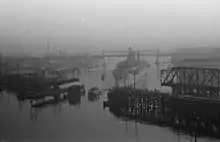Kitsilano Trestle
The Kitsilano Trestle[1] (also known as CPR trestle[2] and CPR Kitsilano trestle[3]) was a former railway bridge over False Creek, in Vancouver, British Columbia, Canada.

The first bridge, a timber trestle was began in 1886[4][5][6] or 1888[7] to carry the Canadian Pacific Railway (CPR) to a proposed port on English Bay on the Kitsilano side, south of the Indian Reservation. It connected to more CPR lines on the south side, including the Arbutus Corridor to Richmond, purchased from the CPR in 2016 after a lawsuit decided by the Supreme Court of Canada.[8][9]
However, due to the railway's decision to locate its depot and yards on the north side of False Creek (modern-day Yaletown) meant that the trestle saw little use until street cars of the B.C. Electric Railway rolled over it 1905.[7]
Being fixed, it blocked the flow of marine traffic into False Creek and was replaced in 1905 with a second bridge with a swinging span.
After World War II, industry began to leave False Creek, meaning the CPR used the Arbutus Corridor less. The second trestle was demolished in 1982, in anticipation of the World's Fair of 1986 (Expo 86).[4][10] While there were proposals to convert the rail bridge to a pedestrian bridge, city council refused, citing the impaired flow of water into False Creek.[11]

Expo 86 brought a complete redevelopment of the False Creek area, notably due to the influence of Hong Kong entrepreneur Li-Ka Shing and his company Concord Pacific, which transformed the north shore into modern condominiums.[12]
The bridge was pivotal in the development of northeast modern-day Kitsilano, as the trestle provided quick access by streetcar to the inner city.[13]
References
- "Kitsilano Trestle - City of Vancouver Archives". searcharchives.vancouver.ca. Retrieved 2022-07-31.
- "[View of Rat Portage Lumber Company from the C.P.R. Trestle Bridge] - City of Vancouver Archives". searcharchives.vancouver.ca. Retrieved 2022-07-31.
- "[Squatter's shacks on the northwest side of the C.P.R. Kitsilano trestle bridge] - City of Vancouver Archives". searcharchives.vancouver.ca. Retrieved 2022-07-31.
- Adams, Amy Loelle (2014). "Historic Kitsilano: Northeast Map Guide" (PDF). Vancouver Heritage Foundation. Retrieved 2022-07-10.
- Elligott, Frederick Joseph (1977). The planning decision-making process of Vancouver’s False Creek : a case study 1968-1974 (MA thesis). University of British Columbia. doi:10.14288/1.0094183.
- Blissett, Rebecca (2014-05-20). "City Living: A walk down the Arbutus Corridor". Vancouver Is Awesome. Vancouver Courier. Retrieved 2022-07-31.
- Churchill, Dennis Michael (1953). False Creek development: a study of the actions and interactions of the three levels of government as they affected public and private development of the waterway and its land basin (MA thesis). University of British Columbia. doi:10.14288/1.0106692.
- Bula, Frances (2016-03-07). "Vancouver acquires Arbutus rail corridor from CP for $55-million". The Globe and Mail. Retrieved 2022-07-31.
- Harris, Douglas (2012-01-01). "A Railway, a City, and the Public Regulation of Private Property: CPR v. City of Vancouver". Canadian Property Law Stories: 455–486.
- Davis, Chuck (2010-04-07). "Vancouver's 1975 downtown transit plan". Spacing Vancouver. Retrieved 2022-07-28.
- Campbell, Charles (2002-01-17). "Village of the bland: If Vancouver lacks an Eiffel Tower or any other trademark of a truly great city, it is not the fault of citizens such as the visionary Al Clapp, who sees our mayors as mere administrators". Vancouver Sun. pp. A11. Retrieved 2022-07-30 – via ProQuest.
- Harris, Douglas C. (2011). "Condominium and the City: The Rise of Property in Vancouver". Law & Social Inquiry. 36 (3): 694–726. ISSN 0897-6546.
- Carr, Adriane Janice (1980). The development of neighbourhood in Kitsilano : ideas, actors and the landscape (MA thesis). University of British Columbia. doi:10.14288/1.0100259.